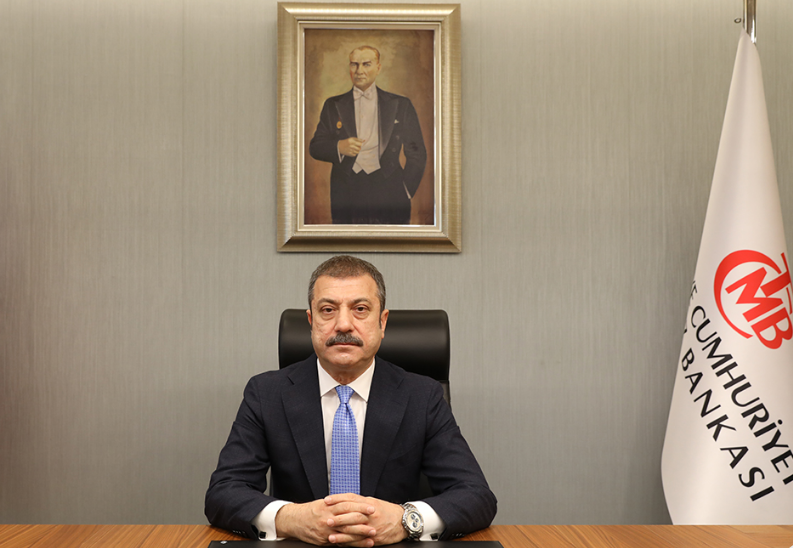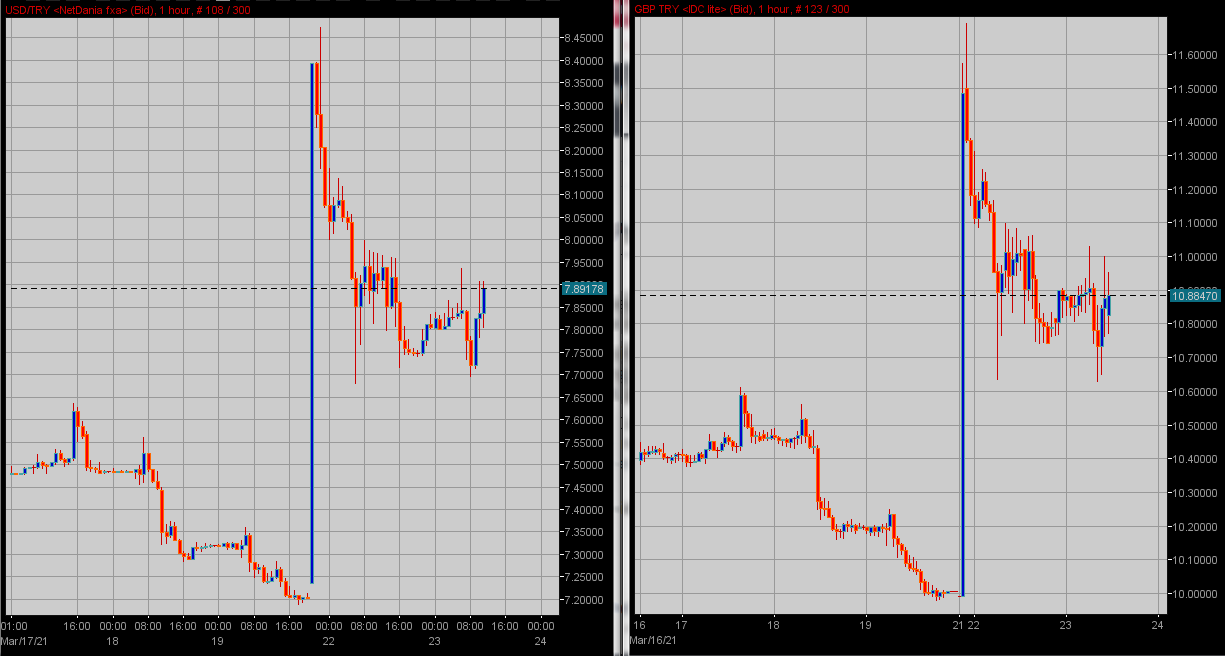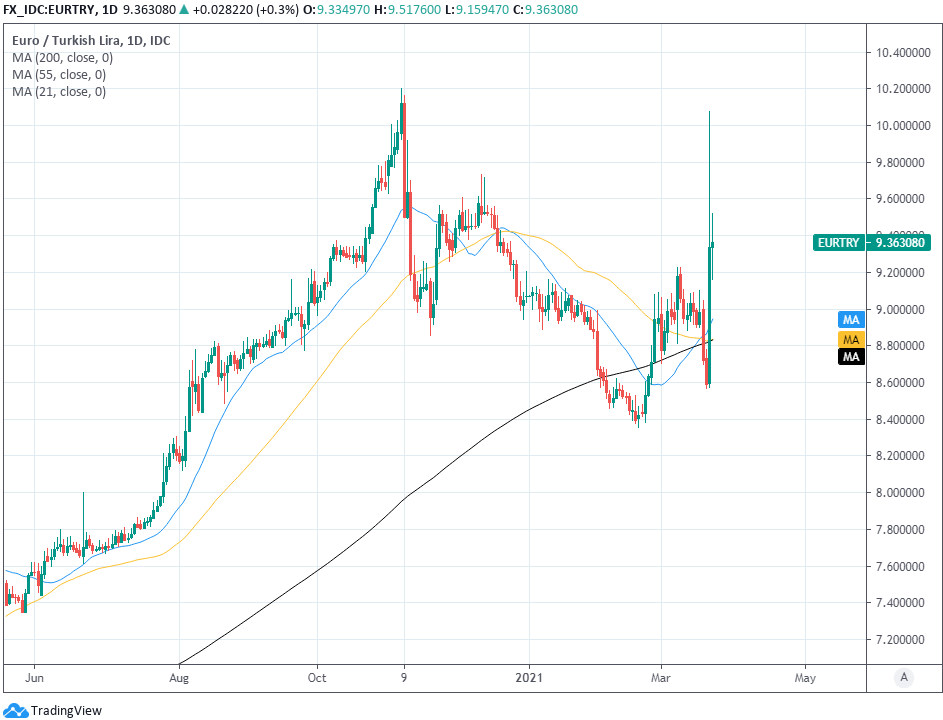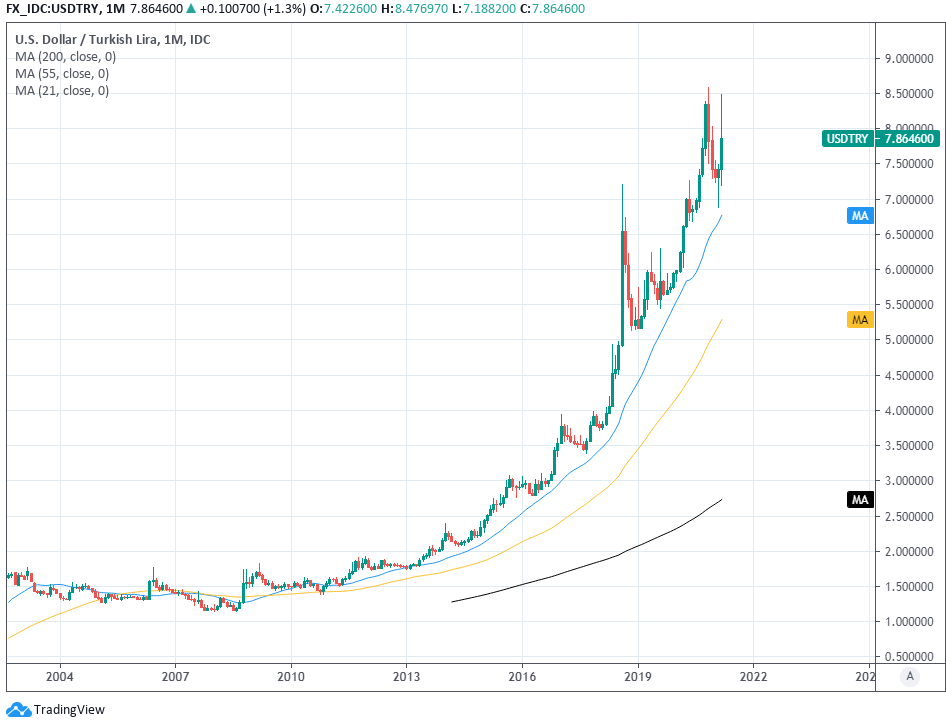Tukish Lira: Commerzbank Tips "Purely Symbolic" 10.00 for USD/TRY
- Written by: James Skinner

Image © Central Bank of the Republic of Turkey, CBRT. Governor Şahap Kavcıoğlu pictured beneath a portrait of Ghazi Mustafa Kemal Atatürk.
- GBP/TRY spot rate at time of writing: 10.86
- Bank transfer rate (indicative guide): 10.48-10.55
- FX specialist providers (indicative guide): 10.70-10.78
- More information on FX specialist rates here
- Set an exchange rate alert, here
The Lira was under pressure Tuesday as the Dollar rose, risk assets tipped lower and the Turkish unit was penalised for Ankara's intervention at the Central Bank of the Republic of Turkey (CBRT), which threatens a new crisis and has seen Commerzbank raise its USD/TRY forecast to 10.00.
Turkey's Lira tumbled against the Dollar, Euro and Pound on Tuesday - though not as much as the Russian Rouble - making it among the worst performing currencies on an intraday basis while providing a clear indication of the likely direction of trave for Turkish exchange rates in the near future.
"The trigger for the next lira crisis is the same as which started off the 2018 lira crisis: the president forcefully re-asserts his unconventional monetary policy philosophy, making it clear that an unknown policy experiment will now be conducted. This particular experiment risks ending in an FX-inflation spiral, therefore ruling out the possibility of any rational economic forecasts for the time being. We revise up our end-2021 USD-TRY forecast from 8.00 to a purely symbolic 10.00," says Tatha Ghose, an analyst at Commerzbank. "The actual outcome is likely to be highly volatile, but the aim of the forecast is to suggest the direction in which to hedge lira exposure."
Above: Selected emerging market exchange rate quotes and performances. Source: Netdania Markets.
Uncertainty abounds after another meddlesome firing of a Turkish central bank governor by Ankara in what was an apparent political response to last week's decision to raise the cash rate from 17% to 19%, which saw former finance minister Naci Ağbal ousted and replaced by Şahap Kavcıoğlu.
Kavcıoğlu, who previously did stints as an executive at Esbank and Halk Bank, is also a member of the governing political party whose appointment has riled financial markets in part because he penned a February column in Yeni Safak criticising his predecessor and prescribing lower interest rates for combatting above-target inflation.
"Turkey inflation for years, somehow failed to get the results they want in the economy due to the impact of interest rate and exchange rate together. Especially in the nineties, the high levels of all three led to one after another crisis in our country," an imperfect translation of the column's opening reads.
The new governor was reported to be meeting on Tuesday with general managers of Turkish commercial banks. Speculation is that these firms provide the central bank with foreign exchange liquidity using FX swaps - a form of derivative. It may not be a coincidence that Russian Rouble losses were larger than Lira losses on Tuesday.
Above: USD/TRY (left) and GBP/TRY (right) at hourly intervals. Click for closer inspection. Source: Netdania Markets.
USD/TRY, GBP/TRY and EUR/TRY rose as much as 17% at the Asia open Sunday while Turkish stocks saw high single digit losses in Istanbul Monday.
"Bleeding in the currency has been halted for now after nosediving almost 15% from Friday's close. USD/TRY resumed trading at 7.7775 after Presidential advisor Bulut spoke to the CBRT and said no extraordinary measures were planned and there would be no pulling back from free market policies," says Kenneth Broux, a strategist at Societe Generale.
While selling has since abated somewhat, the direction of travel is clear and many analysts are readying for what could quickly become a new crisis in the event that borrowing costs are lowered in the face of double-digit inflation that was more than three times the target level of 5% during February.
"Inflation still runs high and the replenishment of FX reserves has been very limited. Keeping the TRY in check without hiking rates will be a very difficult balancing act," says Sebastien Barbe, head of emerging market strategy at Credit Agricole CIB. "Beyond the central bank’s reduced credibility, foreign investors would likely be deterred by the increased likelihood of unorthodox measures. For the TRY, it will likely get worse before it (maybe) gets better."
Crucially and for the time being at least, Kavcioglu has not yet reduced the policy rate but given his widely publicised views are very much in alignment with those of President Recep Tayip Erdogan's, that and all of its consequences for the Lira may now be just a matter of time. And it's because the two share the same heterodox views on economics, inflation and interest rates that Kavcioglu's maiden statement as CBRT Governor cannot be reliably interpreted as a commitment to not cut interest rates.
"Duties and powers within the framework established by Law in line with the fundamental objective of achieving lasting decline in inflation will continue to use monetary policy tools in an effective manner," Kavcioglu says in a Saturday statement published to the bank's website.
Above: Euro-Lira shown at daily intervals with selected moving-averages.
"While the decline in inflation will positively affect macroeconomic stability through the decline in country risk premiums and permanent improvement in financing costs, it will also contribute to the creation of the necessary conditions for sustainable growth that will increase investment, production, exports and employment," Kavcioglu continues.
Given President Erdogan and Governor Kavcioglu's views, the above statement could or perhaps even should be interpreted as a hint that interest rate cuts are on the way. Certainly if higher interest rates are, as far as Turkish policymakers are concerned, what leads to higher inflation. And it remains to be seen whether the above-referenced "permanent improvement in financing costs" comes before or after any decline in Turkish inflation figures.
President Erdogan's idea is that higher interest rates cause higher inflation and vice versa is exactly the expressed view of Kavcioglu but the opposite of the principle on which a great many other central banks are operating on. All of this may be rooted in more than just economic heterodoxy however.
Erdogan has previously lamented "the shackles of interest rates, exchange rates and inflation," likening acceptance of them to "modern-day capitulations" equivalent to those of Ottoman leaders following the first world war. These comments were made at an event celebrating the memory of Ghazi Mustafa Kemal Atatürk, a military field marshal who founded the republic after leading Turkey's war for independence. Atatürk is pictured in a portrait above Governor Kavcioglu in the file image at the top of this webpage.
"Policy will probably be looser and inflation higher than we had previously expected, which would directly hurt the lira and local-currency government bonds. What’s more, risk premia on Turkish assets and the lira are also likely to rise further in our view," says Franziska Palmas at Capital Economics. "Turkey’s large external vulnerabilities mean that there is now a high risk of a full-blown balance of payments crisis. Further sharp falls in the lira would potentially also be a problem for Turkey’s banks given their significant short-term FX liabilities and the CBRT’s extremely low foreign exchange reserves."









